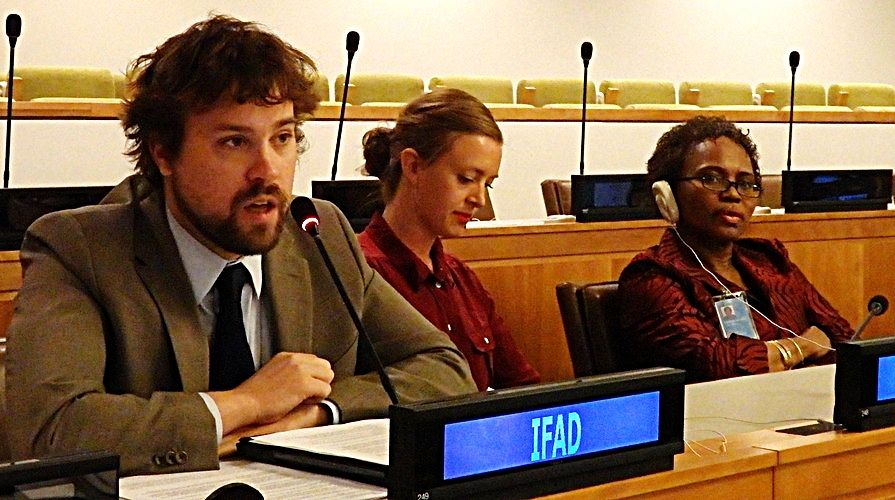Advancement of Women, General Assembly's 3rd Committee
16/10/2013

Mr. Chairman,
At the outset, permit me to congratulate you and the members of the Bureau on your election, and to assure you of our support during the deliberations of the Committee. I am pleased to deliver this statement on behalf of the Rome-based Agencies, FAO, WFP and IFAD.
The importance of empowering women cannot be overstated. This is particularly important in rural areas. Women represent 43 per cent of the agricultural work force worldwide and as much as 70 per cent in some countries. Often working longer hours than men, rural women are also the caregivers who look after children, the elderly, and the sick. In addition, many rural women are small business entrepreneurs and investors who dedicate most of their earnings to the well-being of their families and societies.
In this context, the RBAs remain committed to the implementation of the programme “Accelerating Progress Toward the Economic Empowerment of Rural Women”, which is a five-year joint initiative with UN Women. This programme draws on each of our agencies comparative advantages in 7 countries - Ethiopia, Guatemala, Kyrgyzstan, Liberia, Nepal, Niger and Rwanda. Through strengthened collaboration, we hope to increase the impact of our programmes.
Together with the respective countries, we have identified national priority areas on which to work. These include:
- strengthening women’s self-help organizations and cooperatives
- training women small holders to increase their productivity, including marketing and credit management
- mobilizing and strengthening self-help groups, inclusive of the provision of services and inputs
- enhancing capacity to facilitate poor women’s access to Savings and Loan Associations
- supporting maternal, infant and child nutrition through provision of supplementary food and promotion of nutrition-sensitive gardening
- strengthening rural women’s leadership and entrepreneurship capacities
- enhancing gender-responsive delivery of agricultural services and support of rural women’s groups
Accelerating the economic empowerment of rural women is a major task, which cannot be achieved by our four agencies alone – therefore, the programme is very much open to collaboration with other partners.
During the recent session of CEDAW in Geneva, the RBAs and UN Women came together in support of the preparation of a general recommendation on article 14 of CEDAW so that it reflects the reality facing rural women. We reiterate our thanks to CEDAW for providing the opportunity for this discussion in which there was a rich dialogue, with participation by CEDAW experts, member states, the UN System, Civil Society and other stakeholders.
Since the CEDAW Convention was adopted in 1979, the global landscape has undergone a tremendous change, especially in rural areas as demographics shift. Indeed, agriculture has become feminized in many places, with older women the last ones left behind to take care of farms and grand- children. Rural women need to play an important role in this new era but still face many obstacles. We believe that CEDAW can contribute to overcoming these challenges though achievements such as:
- Creation of an enabling environment to acheive equity between rural women and men as well as girls and boys;
- Rural women’s equal access to land, inheritance and property;
- Opportunities for decent rural employment, livelihood and training for women and girls;
- Empowerment of women to participate in decision making at all levels;
- Active participation of women in discussions with their rural communities on climate change and crisis, resilience-building strategies and social and health protection schemes;
The discussion on rural women is not limited to Article 14. In reality, many articles are related to the status of rural women who face discrimination, whether this discrimination is linked to their living conditions in remote areas that are not served by infrastructure, or to their working conditions in agriculture. Our three entities will further increase our collaboration with CEDAW and continue to support states parties in implementing the Convention.
FAO, IFAD and WFP believe that addressing the persistent gender inequalities and discrimination experienced by rural women requires eliminating structural factors that cause and reproduce these inequalities in the economic, social and political domains.
We are committed to achieving a world of equity without hunger. This requires us to address rural women’s economic empowerment through the promotion of gender equality and the rights of rural women. Through our strong partnership, we hope to achieve greater and more sustainable results.
I thank you.
